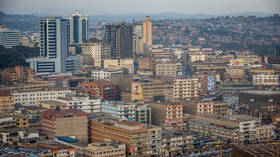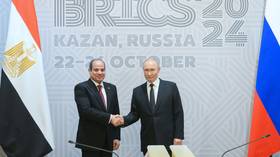US-sanctioned state to become BRICS partner

Uganda will officially become a BRICS partner state on January 1, Yury Ushakov, an aide to Russian President Vladimir Putin, told reporters on Monday. He said the East African nation is one of nine countries that have confirmed their readiness to receive the status.
In November last year, US President Joe Biden expelled Uganda, along with the Central African Republic, Gabon, and Niger, from Washington’s flagship African Growth and Opportunity Act trade program, citing “gross violations” of participation requirements.
The landlocked country had been exporting goods, including coffee and textiles, to the US for many years under the initiative, which came into force in 2000. It grants qualified sub-Saharan African countries duty-free access to the American market.
The BRICS ‘partner country’ category was established at the group’s summit in October, hosted by Russia in Kazan, and is intended to serve as an alternative to membership after over 30 countries applied to join the group. Holders of this status can permanently take part in special sessions of BRICS summits, ministerial meetings, and other high-level events. Partners can also contribute to the group’s outcome documents.
“One of the important results of the summit [in Kazan] was the establishment of the category of BRICS partner countries and agreement on a list of 13 states. Appropriate invitations were sent to these states,” Ushakov said at a press briefing.
“Confirmations of readiness to become a BRICS partner state have been received by today from Belarus, Bolivia, Indonesia, Kazakhstan, Cuba, Malaysia, Thailand, Uganda, and Uzbekistan,” he announced.
He added that confirmation is expected from four more countries in the near future.
BRICS initially comprised Brazil, Russia, India, China, and South Africa, and was expanded earlier this year to include Egypt, Iran, Ethiopia, and the United Arab Emirates.
Several African countries have expressed interest in joining the group in recent years, as they seek partnerships beyond their traditional Western partners in order to diversify their trade and economic ties. Earlier this month, Nigeria asked South Africa to support its bid to join the BRICS group of leading and emerging economies. Zimbabwe and Algeria are also seeking membership.
Patricia Kishemeire, the ambassador of the International Municipal Cooperation Forum of the BRICS in Uganda, said in an October analysis article that the alliance provides new financial alternatives, such as the New Development Bank, which supports public projects through “equitable lending and participation.”
She added that Kampala’s engagement with BRICS will help diversify export options for the country, whose economy is heavily reliant on agricultural products such as coffee and tea.
“Through trading with BRICS, African countries could reduce dependency on the US dollar and lessen the vicious debt burden and sanctions,” the ambassador stated.













